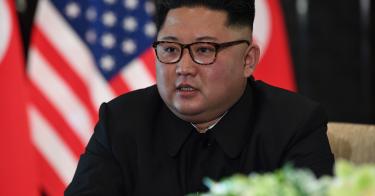“There was never a good war or a bad peace,” Benjamin Franklin purportedly wrote. The maxim certainly hails from a different time, but despite some notable exceptions it is hard to argue with the rule.
Yet peace should not be rushed. And patience should especially temper the prospects of a possible U.S.-North Korea “peace declaration,” a political agreement that would rhetorically declare an end to hostilities between Washington and Pyongyang.
Such a peace declaration -- one that would fall short of a formal peace treaty -- could be under discussion at the next summit between U.S. President Donald Trump and North Korean leader Kim Jong Un, expected to take place in February. It could even be seen as a diplomatic deliverable at the meeting.
There is no doubt that some positive developments were birthed at the Trump-Kim summit in June. Overall tensions have relaxed, and there have been no North Korean nuclear or missile tests in the months since.
Still, moving ahead with a peace declaration that would do little more than superficially end the Korean War could threaten American interests and policy in several unintended ways.
First, a little background.
The 1950-1953 Korean War ended in an armistice, not a formal peace treaty. The cease-fire agreement was signed by the U.S. military on behalf of the United Nations Command and by the North Korean military for North Korea and the Chinese People’s Volunteers at Panmunjom in July 1953.
Since then, the Demilitarized Zone at the 38th parallel has served as the dividing line between North Korea and South Korea. It mediates a sometimes hot but mostly frozen conflict that is stretching toward its seventh decade without a final peace.
Since serious diplomatic talks have resumed with Washington, Pyongyang has been pushing for a peace declaration as a necessary step that must be taken before it will consider any moves toward denuclearization.
In North Korea's view, declaring a political conclusion to the Korean War would further ease friction with the United States and would promote trust between Seoul, Washington and Pyongyang as negotiations proceed.
This peace declaration would leave the heavy lifting on other important matters -- a formal peace treaty, official diplomatic recognition, confidence- and security-building measures, etc. -- for later on.
Moreover, it would not likely result in any immediate change in the disposition of U.S., North Korean or South Korean conventional forces. Nor would it bring about any reductions in Pyongyang’s nuclear weapon or missile forces.
In essence, a peace declaration would be little more than a symbolic gesture of potential better political relations between Washington and Pyongyang.
As envisioned, this “starter” peace pact, even if it is concluded, seems rather inconsequential in creating the real conditions needed for peace and security on the Korean Peninsula, especially considering the unchanged disposition of the belligerents’ conventional and strategic forces.
If that is the case, why is Pyongyang pushing for it?
North Korea might be betting on a bevy of potential benefits that could come to the regime after signing a peace declaration with the United States, finally ending what Pyongyang calls Washington’s outdated, anti-North Korean “hostile policies.”
For instance, once peace has supposedly been declared between Washington and Pyongyang, what stops North Korea from pushing for an additional reduction in U.S.-South Korea exercises? That could hurt our military readiness.
Demands could easily go beyond military maneuvers.
The signing of a peace declaration could also strike up a chorus of politicians and opinion leaders in the United States and across the globe. What if these voices begin to call for a rash drawdown or even withdrawal of American troops from the Korean Peninsula before a formal peace treaty is signed?
Indeed, South Korean public sentiment could certainly move in that dangerous direction. It would be promoted by anti-American sympathizers, North Korean supporters, and problematic propagandists active in Northeast Asia.
This would certainly play to North Korea’s advantage.
Pyongyang might also feel that it has grounds to insist that Washington abandon the layers of punitive economic sanctions that have been heaped upon North Korea since it started the Korean War.
Further, a peace pact could give license to China and Russia to violate (or further violate) already leaky U.N. trade sanctions against North Korea over its threatening nuclear weapon and ballistic missile programs.
Few would argue that Pyongyang sees sanctions relief as key to the regime’s survival as well as its international legitimacy.
Penning a premature U.S.-North Korea peace declaration could also lead to significant political tensions with our South Korean and Japanese allies if it does not protect and advance their national interests sufficiently.
You are no doubt beginning to see the issue: a peace declaration at this point in the negotiating process could create big problems.
It gives Pyongyang leverage to make more demands. It might also significantly reduce the political, economic and military pressure on the Kim regime, possibly undermining its willingness to address issues essential to peace and security.
A peace pact to end the Korean War once and for all may be in the future. Regrettably, a peace declaration now is not the way to get there.
This piece originally appeared in Real Clear World



